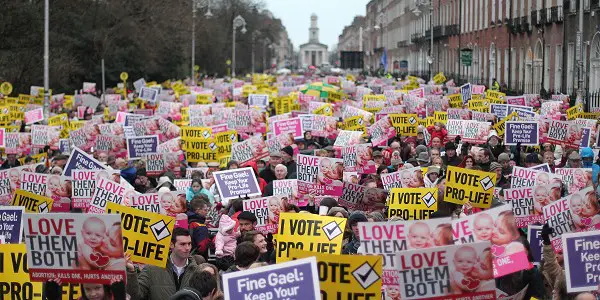Momentum is building for a referendum on repealing the eighth amendment governing abortion, campaigners said.
Labour pledged to overturn the law as part of its manifesto. The party said it would reinstate the constitutional convention next year and provide it with more time to consider broad issues in greater detail.
Taoiseach Enda Kenny has pledged to hold a constitutional review of the bitterly divisive issue if re-elected.
Alison Begas is chief executive of the Dublin Well Woman Centre, which supports thousands of women a year with crisis pregnancy advice and other services.
She said: “There is a real momentum now and a generation of younger women and younger activists pushing for the repeal of the amendment and highlighting how it is a barrier to women’s healthcare, women’s well being and women’s rights to control their own bodies.
“There is momentum building to call for a referendum.”
She said a lot of politicians were saying they could not go for a referendum as they did not know what they would replace it with.
Ms Begas claimed the state had no role in regulating people’s health care and said a referendum was inevitable.
“These things all add to the momentum because they all all highlight how restrictive the eighth amendment is.”
The Pro-Life Campaign said it was a non-denominational human rights organisation, drawing its support from a cross-section of Irish society.
It described the eighth amendment to the Constitution as Ireland’s original life equality amendment.
“Notwithstanding the abortion legislation of 2013, the eighth amendment provides the last remaining protection for the unborn child in Ireland and must be robustly defended.
“Each human being regardless of age, gender, disability, race, status in society, possesses a profound, inherent, equal and irreplaceable value and dignity.
“Abortion advocates want the unborn child to be an exception to this rule. To do this they resort to the ploy of denying the humanity of the unborn.
“The sign of a truly civilised society, however, is one that welcomes everyone in life and protects everyone in its laws.”
Patricia Cusack, 19, from Limerick was canvassing for student elections at Trinity College.
She sympathised with thousands of women who travelled for England for the procedure.
“They are stuck in a situation that they don’t want to be in but there is no other option for them.
“I think if you don’t want an abortion that is fine but if you want an abortion you should have the right and ability to do so and not be forced to move and not tell your parents.”
In 2014 a woman declared clinically brain dead was granted permission by a court to be taken off life support because there was no genuine prospect of her baby being born alive.
The last constitutional convention, chaired by former Concern Ireland head Tom Arnold, was a key aim in the Programme for Government announced in March 2011.
The original target to complete the work within a year was not met and many of its recommendations were not put to referendum.
Labour said the constitution must be a living and breathing document, regularly adapted to ensure it reflects society and its values.
“We will continue to seek the permission of the people to make constitutional changes that will enhance their rights.”
It said the marriage equality referendum will long be remembered as a watershed moment in Irish society.
The party would re-establish the convention with a mandate to examine end-of-life issues, the place of faith in the constitution including whether religious declarations should be required of office holders, allowing positive discrimination to combat inequality for those with disabilities and the role of the State as a custodian of the physical environment, including the public water supply.
